Domain Expert: Shelly Dickinson, Psychology & Neuroscience
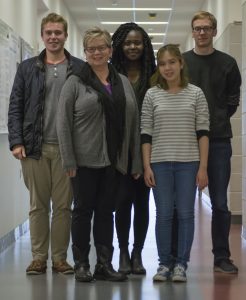
Title: Alcohol Place Conditioning Studies in Mice
Description: Most theories of drug abuse and addiction are predicated in part on the assumption that most humans use, abuse, and subsequently become addicted to alcohol and other drugs because of the reinforcing and rewarding effects these substances produce (e.g., euphoria, relief from negative feelings). My primary research interest is the understanding of the neuropharmacological mechanisms underlying the effects of drugs of abuse, in other words, what’s happening in the brain while these drugs are on board. I’m especially interested in whether adolescents are affected differently by alcohol than adults, and use adolescent mice in the lab to look at these questions.
The processes of conditioning (association of environmental cues and drug effects) are thought to be extremely important in craving and relapse in humans in that environmental cues can come to guide and even control behaviors such as drug-seeking. We utilize a range of conditioning procedures in the lab, including place conditioning and taste conditioning. We are also developing a sign-tracking procedure to look specifically at conditioned approach behaviors.
Domain Expert: Ashley Hodgson, Economics
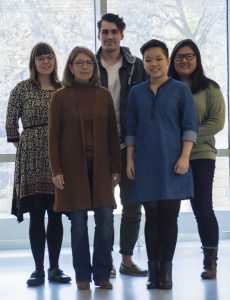
Title: How Do Doctor Practice Styles Spread? Peer Effects and Opinion Leadership when Doctors Switch Hospitals
Description: Research has shown dramatic differences across doctors and regions in styles of practicing medicine. Some doctors treat patients aggressively with surgery while others wait and watch. Practice styles are particularly important, because both cost and quality of care are linked to the small decisions doctors make on a daily basis. Improvement in the cost and quality of health care will depend on the health system’s ability to incentivize doctors to adopt the most effective styles and disadopt ineffective ones. Yet practice styles seem to be influenced by semi-random factors, such as region, where a doctor went to medical school and the facility where they work. In other words, doctors’ practice styles are influenced by their peer network. In this project, we seek to learn more about the way that practice styles spread across doctor networks. Which of a doctor’s practices change when that doctor switches to a new hospital with a new peer group? We also seek to identify opinion leaders (and characteristics associated with those opinion leaders) by identifying which doctors’ practice styles are adopted by others when they move into a new facility setting.
We will utilize a patient-level data set containing all patients discharged from Florida hospitals over a four-year time period. The data set contains demographic information, ICD-9-CM codes (diagnosis and procedure codes), attending physician and hospital information. We will use this data to identify doctors who switched from one hospital to another over the time frame. For each doctor, we will ask two questions: (a) After switching, did they change their practice style to more closely resemble other doctors in their hew hospital? And, if so, in what ways did those practices change? and (b) Did they become opinion leaders in their new hospital, bringing new practice styles to other doctors in the hospital?
Domain Expert: Emily Mohl, Biology
Title: The Impact of Milkweed Seed Sources on Habitat Restoration
Description: Both conservation biologists and ordinary citizens are alarmed by recent declines in the population of monarch butterflies. Monarch caterpillars depend on milkweed plants as their only food source, but milkweed populations have been declining in the last 20 years as more herbicides are used in agricultural fields and other milkweed habitat. In response, many groups are planting milkweed. The research project asks the question: “How will the source of milkweed seeds impact milkweed habitat restoration efforts? Evolutionary principles suggest that planting seeds from distant locations has the potential to harm local populations, but there is not currently good evidence about the implications of these practices for milkweed plants. Our research will take two parts: 1. a greenhouse study to investigate geographic variation in plant responses to herbivory/damage. 2. a field study to determine whether plants are locally adapted to their site of origin (which would indicate that milkweed restoration should rely on local seed sources). We will analyze data from a study in which plants from 10 sites are grown at their home site and ~3 foreign sites. We will determine the best measurements and replication needed to detect patterns of adaptation and make recommendations to improve the project in the future.
Domain Expert: Jess Petok, Psychology
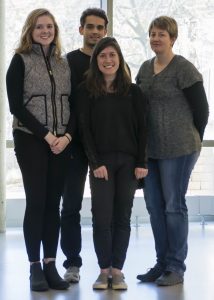
Title: Health Aging and Feedback-Based Learning
Description: People often rely on previous learning of subtle associations to make decisions in novel settings. That is, people learn from feedback about the consequences of their choices and then use these experiences to predict future outcomes. This ability to learn from experience and apply that knowledge to new situations is critical for daily tasks, including social interactions (deciding whom to date), business choices (weight what to buy) or financial transactions (choosing what to invest in), and is necessary for adults of all ages.
This project will examine how health aging can influence such feedback-based learning and generalization of knowledge, and how these relationships vary by common genetic polymorphisms. Said differently, we will explore whether genetics can contribute to variability in these two types of cognitive function across healthy younger and older adults. Together, we will examine what factors can predict age-related sparing of cognitive functions or age-related declines. The identification of cognitively relevant genes, and the age-related differences therein, brings promise to refine knowledge about neurobiological mechanisms of cognition and may help to explain heterogeneity of cognitive function in old age. This understanding, in turn, may ultimately inform cognitive training programs aimed at maximizing cognitive functioning in old age – a goal that is becoming increasingly important with the rising number of older adults in society.
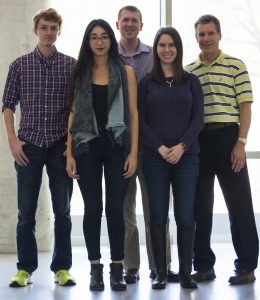
Title: International Criminal Court’s Effectiveness in Colombia
Description: In 1998, world leaders adopted the Rome Statute, creating the International Criminal Court. The Court’s mission is to prosecute perpetrators of genocide, war crimes, and crimes against humanity. Since the Court’s jurisdiction started in 2002, critics of the institution have lambasted its inefficiency; the Court has spent over $1 billion and 15 years convicting only four individuals. Opponents of the Court have also cited an anti-African bias, a lack of political support from key states (United States and China), a propensity to undermine peace agreements, and an inability to stem or deter attacks on civilians. However, proponents of the Court argue that the institution was founded on the idea of complementarity. The Court is only meant to be a failsafe, having jurisdiction over crimes only if governments are unable or unwilling to prosecute war criminals domestically. Although the Court aims to hold war criminals accountable and deter attacks, another one of its primary functions is to work with states to improve their rule of law so that domestic actors can no longer commit crimes with impunity.
In this project, we will examine the question: does the International Criminal Court (ICC) effectively protect civilians? In particular, we explore whether key ICC interventions, particularly those meant to improve domestic rule of law, reduced violence towards civilians during the decades-long civil conflict in Colombia. We will first perform data management, transforming a dataset of daily observations (1981-2012) so that it is suitable for analysis. We will then perform survival and time-series analysis to test the Court’s effectiveness in protecting civilians. Time permitting, we will research the plausibility of text analysis to describe rebel group and paramilitary leaders’ language during key ICC events. Spanish language skills are not required for this project but may prove helpful.
Domain Expert: Matthew Wright, Mathematics
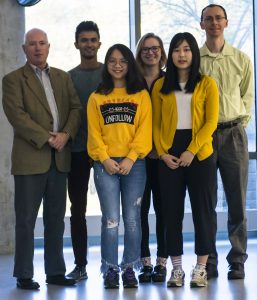
Title: Topology for Multi-Parameter Data Analysis
Description: In the past decade, the mathematics of topology have been employed for the analysis of complex, high-dimensional data. The most prominent mathematical tool in this area is persistent homology, which has been used to analyze data from fields such as neuroscience, computer graphics, biology, and more. Persistent homology produces algebraic invariants called persistence modules that capture topological and geometric structure of data, which can be readily computed and visualized. In particular, multidimensional (or multiparameter) persistent homology is a current area of research that shows promise for the analysis of noisy data. Multidimensional persistent homology is especially useful for discerning the structure of complex geometric data. To facilitate the use of multidimensional persistent homology in practice, Matthew Wright (St. Olaf) and Mike Lesnick (Princeton) are developing the software program RIVET for computing and visualizing multidimensional persistent homology. RIVET has recently become available for use in the analysis of real-world data.
In this project, students will explore two questions: What insights can multidimensional persistent homology provide into real-world data? What statistical techniques are relevant for establishing the significance of results obtained by multidimensional persistent homology? Students will use RIVET to analyze data arising from the structure of Wikipedia, networks, geology, and other areas. Students will consider the practical and statistical significance of their findings, contributing to the development of statistical techniques for multi-parameter persistent homology. Specifically, students will investigate the use of the 2-D matching distance on two-parameter persistence modules for statistical analysis.
You must be logged in to post a comment.